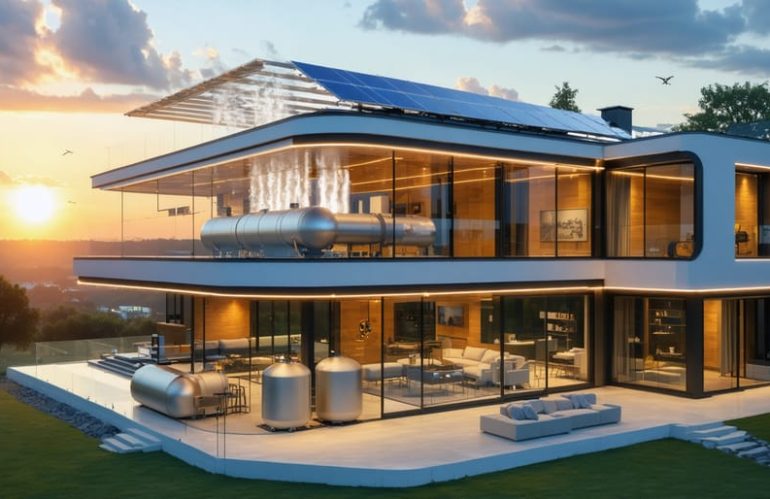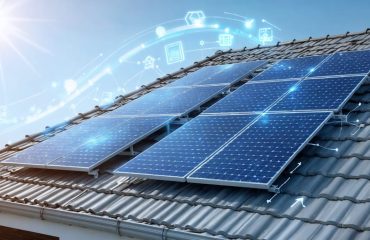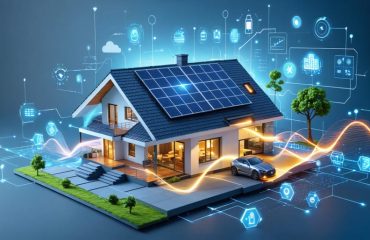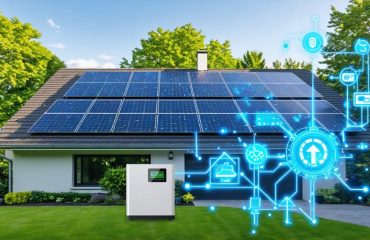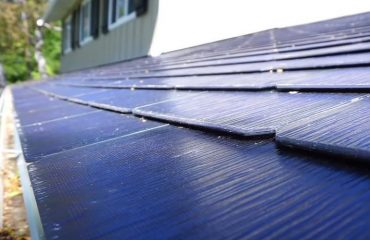Imagine powering your entire home with the same element that fuels our sun – hydrogen. Hydrogen fuel cells represent a groundbreaking shift in residential energy technology, offering a clean, efficient way to generate electricity while producing only water as a byproduct. Unlike traditional solar panels that depend on daylight, these remarkable devices can produce power 24/7, transforming the way we think about home energy independence.
As global leaders race to combat climate change, hydrogen fuel cells have emerged as a promising solution for sustainable living. These electrochemical powerhouses combine hydrogen and oxygen to generate electricity through a process that’s nearly twice as efficient as conventional combustion engines. For homeowners seeking reliable, clean energy alternatives, fuel cells offer a compelling combination of environmental responsibility and practical performance.
The technology has already proven its worth in various applications, from powering forklifts in warehouses to providing backup power for data centers. Now, as costs decrease and efficiency improves, hydrogen fuel cells are poised to revolutionize residential energy systems, offering homeowners a powerful tool in their journey toward energy independence and environmental stewardship.
How Hydrogen Fuel Cells Actually Work
The Simple Science Behind Fuel Cells
A fuel cell works much like a battery, but instead of running down, it continues producing electricity as long as hydrogen fuel is supplied. The process is surprisingly straightforward: hydrogen gas flows into one side of the cell while oxygen from the air enters the other side. These gases meet at a special membrane that acts like a filter, separating the hydrogen into protons and electrons.
The protons pass through the membrane, but the electrons must take a detour through an external circuit, creating an electrical current that can power our homes and devices. When these components reunite on the other side with oxygen, they form pure water as the only byproduct – no harmful emissions, just H2O.
Think of it like a continuous assembly line where hydrogen and oxygen come together to make electricity and water. The beauty of this system lies in its simplicity and cleanliness. Unlike traditional power generation that burns fuel, fuel cells create electricity through a chemical reaction, making them more efficient and environmentally friendly.
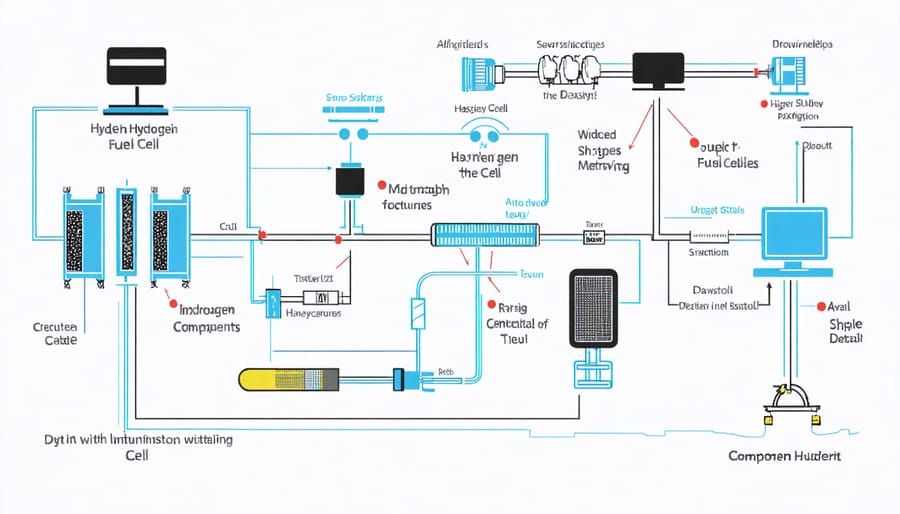
Why It’s Cleaner Than Traditional Energy
Hydrogen fuel cells represent one of the cleanest energy solutions available today, with water vapor being their only byproduct. Unlike traditional fossil fuels that release harmful greenhouse gases and pollutants, hydrogen fuel cells combine hydrogen and oxygen in an electrochemical process that produces electricity without combustion. This means no carbon dioxide emissions, no particulate matter, and no harmful pollutants that contribute to air quality issues or climate change.
The environmental benefits extend beyond just clean operation. When hydrogen is produced using renewable energy sources like solar or wind power, the entire energy cycle becomes virtually emission-free. This “green hydrogen” production process creates a truly sustainable energy loop, from generation to consumption.
Additionally, hydrogen fuel cells don’t require environmentally harmful mining operations or create toxic waste that needs special disposal. The water vapor produced can even be captured and recycled, making these systems highly efficient in terms of water usage. For homeowners concerned about their environmental impact, fuel cells offer a way to power their homes while maintaining a minimal ecological footprint.
Hydrogen Production Methods for Home Use
Solar-Powered Hydrogen Production
Solar-powered hydrogen production offers homeowners an innovative way to generate their own clean fuel right at home. By combining solar panels for clean energy with an electrolyzer system, you can create hydrogen fuel using just water and sunshine.
The process is surprisingly straightforward: solar panels generate electricity, which powers an electrolyzer that splits water molecules into hydrogen and oxygen. The hydrogen is then stored for later use in fuel cells, providing a reliable source of backup power or fuel for hydrogen vehicles.
A typical home setup includes solar panels, an electrolyzer unit, a water purification system, and storage tanks. During peak sunlight hours, excess solar energy that would normally go unused can be directed to hydrogen production, essentially storing solar energy in chemical form for later use.
This system offers several advantages for homeowners:
– Zero-emission fuel production
– Energy independence from the grid
– Long-term energy storage solution
– Ability to fuel hydrogen vehicles
– Reduced carbon footprint
While the initial investment may be significant, combining solar and hydrogen production creates a sustainable, self-sufficient energy ecosystem that can power your home year-round. As technology advances and costs decrease, this solution is becoming increasingly accessible to environmentally conscious homeowners.
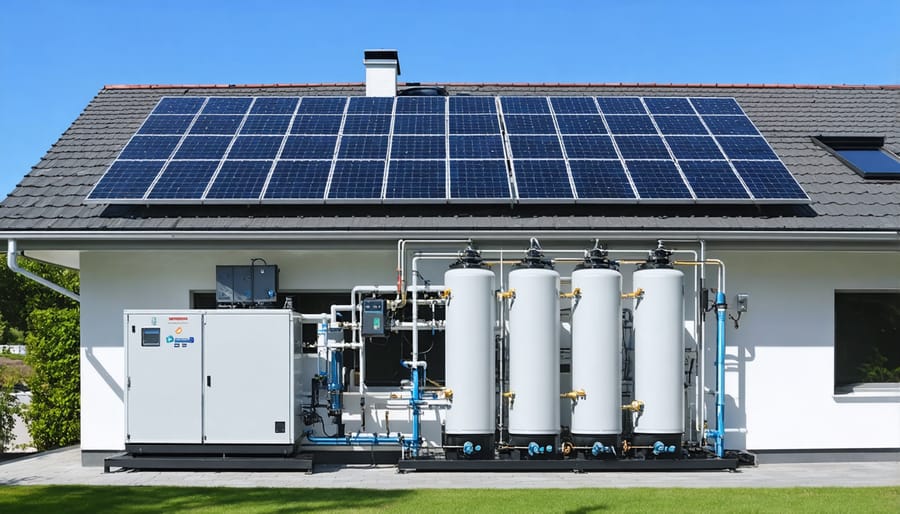
Other Clean Production Methods
Beyond traditional electrolysis, several innovative methods for clean hydrogen production are gaining popularity among homeowners. Solar-powered hydrogen generators are becoming increasingly accessible, combining photovoltaic panels with compact electrolyzer units to produce hydrogen from water. These systems can be integrated with existing solar installations, making them an attractive option for homes already utilizing solar power.
Biomass-based hydrogen production offers another sustainable approach, using organic waste materials to generate hydrogen through a process called gasification. This method is particularly appealing for rural homeowners with access to agricultural or garden waste, effectively turning organic matter into clean energy while reducing waste.
Wind-powered hydrogen systems are emerging as viable options in areas with consistent wind patterns. These systems use excess wind energy during off-peak hours to power electrolyzers, creating a steady supply of hydrogen that can be stored for later use. Some innovative manufacturers now offer small-scale wind-hydrogen systems specifically designed for residential applications.
For homeowners with limited space, microelectrolyzer units powered by renewable energy provide a compact solution. These units can fit in a typical garage and produce enough hydrogen to supplement household energy needs. Many of these systems come with smart monitoring capabilities, allowing users to track production and optimize efficiency through their smartphones.
These alternative methods make hydrogen production more accessible while maintaining high environmental standards and energy efficiency.
Real Benefits for Homeowners
Energy Independence and Reliability
One of the most compelling advantages of hydrogen fuel cells is their ability to deliver reliable, consistent power regardless of external conditions. Unlike solar panels that depend on sunlight or wind turbines that require specific weather conditions, fuel cells operate continuously as long as hydrogen fuel is available. This reliability makes them an excellent choice for homeowners seeking complete energy independence.
Fuel cells can generate electricity 24/7, providing a steady power supply for your home without interruption. This consistent performance is particularly valuable during extreme weather events, power outages, or periods of peak energy demand. Unlike traditional backup generators, fuel cells operate silently and produce zero emissions, making them ideal for residential areas.
When integrated with renewable energy systems like solar panels, fuel cells can fill the power generation gaps that naturally occur with weather-dependent technologies. During cloudy days or at night when solar panels aren’t producing electricity, fuel cells can maintain your home’s power supply, ensuring you never experience interruptions in service.
The system’s reliability stems from its simple operation: as long as hydrogen fuel is available, the fuel cell continues to generate electricity through a chemical reaction. This process isn’t affected by temperature, weather conditions, or time of day. Many modern fuel cell systems also include smart monitoring capabilities that alert homeowners when fuel levels are low, ensuring continuous operation with minimal maintenance requirements.
For homeowners concerned about grid reliability or rising energy costs, fuel cells offer a dependable solution that provides true energy security while supporting environmental sustainability.
Cost Savings Over Time
While the initial investment in hydrogen fuel cell technology may seem substantial, the long-term cost savings can be significant. Homeowners typically see a return on investment within 5-7 years, depending on their energy consumption patterns and local utility rates. The most immediate benefit comes from reduced monthly energy bills, with many households reporting 40-60% savings compared to traditional grid power.
The durability of fuel cell systems contributes significantly to their cost-effectiveness. With proper maintenance, these systems can operate efficiently for 15-20 years, requiring minimal replacement parts. Unlike traditional energy sources, hydrogen fuel cells are not subject to volatile market prices, providing more predictable energy costs over time.
When combined with solar panels or wind turbines, hydrogen fuel cells create an even more economical energy solution. Excess renewable energy can be used to produce hydrogen through electrolysis, essentially storing energy for later use at no additional cost. This storage capability eliminates the need for expensive battery systems and reduces reliance on grid power during peak pricing periods.
Government incentives and tax credits further enhance the financial benefits. Many states offer rebates and tax breaks for installing hydrogen fuel cell systems, potentially reducing the initial investment by 30% or more. As technology advances and production scales up, equipment costs continue to decrease, making hydrogen fuel cells increasingly accessible to homeowners.
The system’s efficiency also improves over time as smart monitoring systems optimize energy production and consumption patterns, leading to additional savings through reduced waste and improved performance.
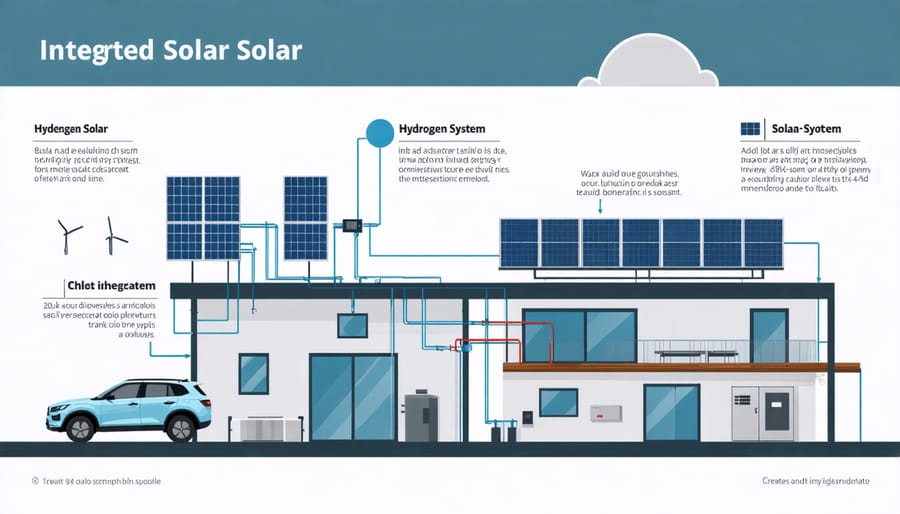
Combining Solar and Hydrogen: The Perfect Match
Energy Storage Solution
Hydrogen fuel cells offer a revolutionary approach to energy storage solutions, particularly for homeowners looking to maximize their renewable energy investments. Unlike traditional batteries, hydrogen can store large amounts of energy for extended periods without losing charge, making it an ideal solution for seasonal energy storage.
When excess solar or wind power is available, this energy can be used to split water into hydrogen and oxygen through electrolysis. The hydrogen is then stored safely in specialized tanks until needed. When electricity is required, the hydrogen flows through the fuel cell, combining with oxygen from the air to produce clean electricity and pure water as the only byproduct.
This storage method offers several advantages for homeowners. First, it provides true long-term energy independence, as hydrogen can be stored indefinitely without degradation. Second, it offers a reliable backup power source during extended outages or periods of low renewable energy production. Finally, the system’s modular nature allows homeowners to scale their storage capacity according to their needs.
While initial costs are currently higher than traditional battery systems, the long lifespan and minimal maintenance requirements make hydrogen storage increasingly attractive for residential applications. As technology advances and prices continue to fall, hydrogen storage systems are becoming a viable option for homeowners committed to sustainable living.
24/7 Clean Power Availability
One of the most compelling advantages of hydrogen fuel cells is their ability to provide consistent, clean power around the clock. Unlike traditional solar panels that only generate electricity during daylight hours, fuel cells can operate continuously as long as hydrogen fuel is available. This makes them an excellent complement to off-grid power systems.
When paired with solar panels, hydrogen fuel cells create a robust energy solution that ensures reliable power delivery day and night. During peak sunlight hours, excess solar energy can be used to produce hydrogen through electrolysis, effectively storing energy for later use. This stored hydrogen then powers the fuel cells during nighttime or cloudy conditions when solar panels aren’t producing electricity.
This combination eliminates the common concern of intermittency associated with renewable energy sources. Unlike traditional battery storage systems that can degrade over time, hydrogen storage maintains its effectiveness without capacity loss. For homeowners, this means consistent power availability without the worry of weather-dependent energy generation or battery replacement costs.
The system’s reliability is particularly valuable during extended periods of low solar production or emergency situations. Whether it’s several overcast days or a power grid failure, your home can maintain its energy independence with clean, efficient power.
As we look toward a more sustainable future, hydrogen fuel cells present a compelling opportunity for homeowners seeking energy independence. By combining this technology with existing solar installations, households can create a robust and reliable energy system that operates year-round, regardless of weather conditions or time of day.
The potential for hydrogen fuel cells in residential settings is particularly promising. Not only do they offer a clean, efficient way to store and generate electricity, but they also provide reliable backup power during outages. This technology could revolutionize how we think about home energy systems, moving us away from grid dependency toward true energy autonomy.
The environmental benefits are equally significant. With zero emissions at the point of use and the ability to produce hydrogen using renewable energy, fuel cells represent a crucial step toward reducing our carbon footprint. As production costs continue to decrease and efficiency improves, hydrogen fuel cells are becoming increasingly accessible to homeowners.
Looking ahead, the integration of hydrogen fuel cells into residential energy systems could become as common as solar panels are today. With supportive policies, advancing technology, and growing consumer awareness, we’re moving closer to a future where clean, reliable, and independent home energy is the norm rather than the exception.
For homeowners considering their energy future, hydrogen fuel cells offer a powerful solution that combines environmental responsibility with practical benefits, making them a worthy investment in both personal energy security and planetary health.

